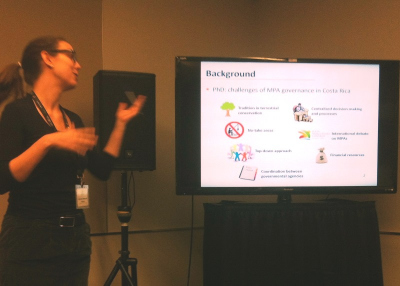Die Inhalte dieser Seite sind leider nicht auf Deutsch verfügbar.
Seitenpfad:
- Graduate School GLOMAR
- PhD student reports
- Conference Reports
- Conference Reports 2015
- Gabriela Weber de Morais
Gabriela Weber de Morais
Report of GLOMAR PhD student Gabriela Weber de Morais about her participation in the 15th Biennial Global Conference International Association for the Study of the Commons in Edmonton, Canada from 25 - 29 May 2015
I joined GLOMAR in July 2012 and up to the beginning of 2015 I had attended two international conferences and one summer school. Whereas in the first two conferences I discussed the theoretical framework of my PhD project, in the summer school I learned more about my research methods. They have been great learning opportunities, but I must admit that getting ready for these meetings was a ‘piece of cake’ when compared to my effort to prepare for the 15th Biennial Global Conference International Association for the Study of the Commons (IASC 2015). The main reason is that the IASC 2015, which took place in the last week of May, 2015 in Edmonton, Canada, was going to be the first occasion in which I would present parts of my results to experts on my topic (marine protected areas), region (Central America) or theoretical framework (institutional theories).
As a result, two months before the conference, I started writing the article for our panel. My paper centred on the transition from a former top-down approach to the management of marine protected areas (MPAs) to more participatory governance models in Costa Rica, that is my case study. Finding the time to concentrate on the paper whilst writing up my PhD monograph was not easy either. Nevertheless, I came up with a draft version of my paper to share with the other panellists prior to the conference. Then, during the preparation of my talk, I realized how difficult it is to prioritize information for a 12-15 min presentation when you have so many details of your results in mind.
The good news is that I eventually succeeded. I managed to prepare a concise and clear presentation and enjoyed very much taking part in the panel. Our presentations fitted well together: MPAs on the high seas, MPAs effects on fishers’ behaviour, the challenges of integrating the ocean’s agenda of the FAO and that of the UN Convention on Biodiversity, and my perspective on participatory governance in MPAs. There were other interesting sessions on coastal areas as well. I had very rewarding exchanges with other PhD students researching MPAs in other Latin American countries. In addition, the keynote speeches and a science fair with schoolchildren from the First Nations (aboriginal peoples in Canada) brought us closer to the environmental conflicts related to the tar sands.
In summary, even if it was difficult to carve out time to work on the paper and attend the conference in the last months of my PhD, the IASC 2015 was a great opportunity to “zoom out” from my thesis, reflect on my results, and engage in fruitful discussions with other researchers. This event along with the others that I mentioned at the beginning of this report also tells us, PhD students, about the benefits of attending meetings at the different stages of the PhD. Finally, I want to thanks MARUM and its Graduate School (GLOMAR) for providing me with the financial support to attend the IASC 2015 and the other conferences that I pointed. They definitely represent a key building block in my development as a researcher.
As a result, two months before the conference, I started writing the article for our panel. My paper centred on the transition from a former top-down approach to the management of marine protected areas (MPAs) to more participatory governance models in Costa Rica, that is my case study. Finding the time to concentrate on the paper whilst writing up my PhD monograph was not easy either. Nevertheless, I came up with a draft version of my paper to share with the other panellists prior to the conference. Then, during the preparation of my talk, I realized how difficult it is to prioritize information for a 12-15 min presentation when you have so many details of your results in mind.
The good news is that I eventually succeeded. I managed to prepare a concise and clear presentation and enjoyed very much taking part in the panel. Our presentations fitted well together: MPAs on the high seas, MPAs effects on fishers’ behaviour, the challenges of integrating the ocean’s agenda of the FAO and that of the UN Convention on Biodiversity, and my perspective on participatory governance in MPAs. There were other interesting sessions on coastal areas as well. I had very rewarding exchanges with other PhD students researching MPAs in other Latin American countries. In addition, the keynote speeches and a science fair with schoolchildren from the First Nations (aboriginal peoples in Canada) brought us closer to the environmental conflicts related to the tar sands.
In summary, even if it was difficult to carve out time to work on the paper and attend the conference in the last months of my PhD, the IASC 2015 was a great opportunity to “zoom out” from my thesis, reflect on my results, and engage in fruitful discussions with other researchers. This event along with the others that I mentioned at the beginning of this report also tells us, PhD students, about the benefits of attending meetings at the different stages of the PhD. Finally, I want to thanks MARUM and its Graduate School (GLOMAR) for providing me with the financial support to attend the IASC 2015 and the other conferences that I pointed. They definitely represent a key building block in my development as a researcher.





